
News Story
First things first – what is Saul all about?
Composed by George Frideric Handel in 1738, Saul tells the story of King Saul, the first king of Israel, and his ultimately destructive jealousy of his successor David. It was inspired by the Book of Samuel from the Tanakh, the Hebrew Bible. David – an Israelite warrior – returns home to rapturous praise after defeating the Philistine Goliath. King Saul is initially welcoming, but grows jealous of his family’s adoration for David and is driven to fury swiftly followed by madness. Forcing his children to choose between him and David, he ultimately leads both his family and the nation of Israel to a tragic crisis. You can read a detailed synopsis by our friends at Glyndebourne here.
So is it an opera?
Saul is not technically an opera but a dramatic oratorio, one of many that Handel composed. Handel’s oratorios were all inspired by religious themes, telling the stories of Biblical characters such as Solomon, Samson and Susanna. Oratorios allowed composers to work around the ban on performances of secular Italian operas during Lent and, due to their Biblical content, were initially intended to only be performed in concert, usually in churches. However, oratorios are now often fully staged as operas, just as operas are often performed in concert.
Who wrote the libretto?
The libretto was written by a man named Charles Jennens, who later went on to become a pioneering editor of Shakespeare’s plays. Saul is the first documented collaboration between Handel and Jennens, although Jennens had previously offered Handel an unknown libretto three years earlier. The pair went on to have a close working relationship, collaborating on a number of projects including Handel’s beloved Messiah, for which Jennens also contributed the libretto. You can watch an extract from Messiah at the 2017 BBC Proms below.
Who are the main players?
The two principal roles are, of course, Saul and David, but Saul’s children are also pretty involved in the story. Michal is the younger of Saul’s daughters, a kind woman who is in love with David from the beginning and eventually becomes his wife. Merab is Saul’s elder daughter, who he originally offered to David for marriage; however, she scorns David's advances due to his lower social standing. Later, however, Merab also grows fond of David and tries to help protect him from her father. Saul’s son Jonathan is caught in the middle, torn between his loyalty to his father and to his friend David, playing the role of protector in Saul’s attempts to murder his rival. There is even a school of thought that Jonathan and David have a romantic relationship – David clearly had a soft spot for Saul’s offspring. The cast also features a priest, a witch and an advisor, amongst others.
The chorus plays an important role throughout the oratorio. At the beginning of the piece, they act as the Israelite people, giving context to the scenes unfolding between the soloists. They provide the initial spark that ignites Saul’s jealousy, as the chorus of women praise David for killing tens of thousands, where Saul has only killed thousands – a classic metric of someone’s merit. As the story continues, they become impartial observers commenting on the action, playing a similar role to that of the chorus in ancient Greek theatre. At the finale, they resume their role as the Israelite population to mourn the tragic ending and despair for the future of their nation.
What’s the music like?
It’s pretty hefty – Handel opted to have one of the largest orchestras possible for the time period, with the most varied instrumentation he ever assembled in London. In addition to the standard orchestral arrangement of the era, Handel added three trombones, a harp, an organ and a carillon, which is a keyboard glockenspiel. The carillon received mixed reviews, with the architect William Kent remarking that he ‘had thought it had been some squerrls in a cage.’
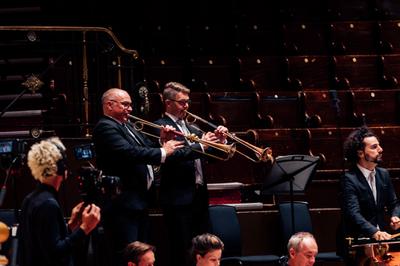
The English Concert
© 2022 Ryan BuchananLetters from Handel’s friends at the time imply that this unusual orchestration stemmed from a desire to emulate ancient Hebrew music, with the trombones representing the Hebrew ram’s horn, or shofar. Handel also borrowed ‘a pair of the largest kettle-drums in the Tower [of London]’ as he could not find any others that were large enough for his needs elsewhere. The drums are thought to have been first used at the state funeral of the Duke of Marlborough at Westminster Abbey in 1722.
Where might I have heard it before?
The ‘Dead March’ from Act Three of the oratorio is commonly used as part of funeral services across the world – fittingly enough, for a piece written to be performed in church. It has been performed at the funerals of numerous significant political figures throughout history, including Winston Churchill, George Washington and Abraham Lincoln.
Who is in the cast?
Neal Davies takes on the title role in this concert, recorded at the 2022 International Festival. The bass was praised for his nuanced depiction of Saul’s unpredictable character: ‘regal in power and vicious in enmity’. Neal Davies is an old friend of the Festival who has appeared frequently since 1992, including performing as the Ghost of Samuel in Saul at the 1999 Festival. Counter tenor Iestyn Davies plays his rival, providing what one reviewer hailed as ‘the most purely alluring sound I’ve heard all festival’. You can hear Iestyn discussing the music and themes of the piece in this podcast by Glyndebourne Opera.
The two Davies are joined by Andrew Haji, James Gilchrist, Sophie Bevan and Liv Redpath, with the Choir of the English Concert performing as the chorus and taking on the smaller solo roles.
Image gallery
A gallery carousel of 4 items
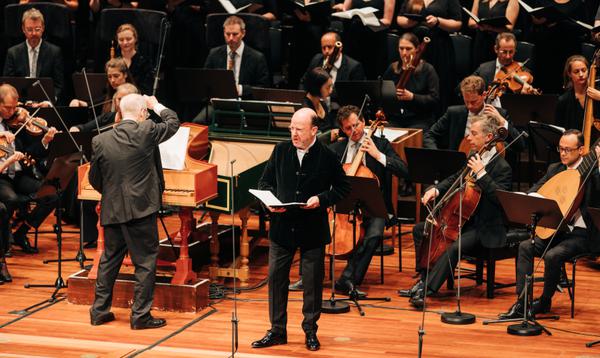
Neal Davies
© 2022 Credit : Ryan Buchanan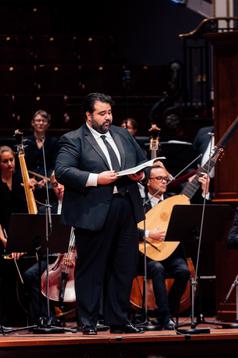
Andrew Haji
© 2022 Credit : Ryan Buchanan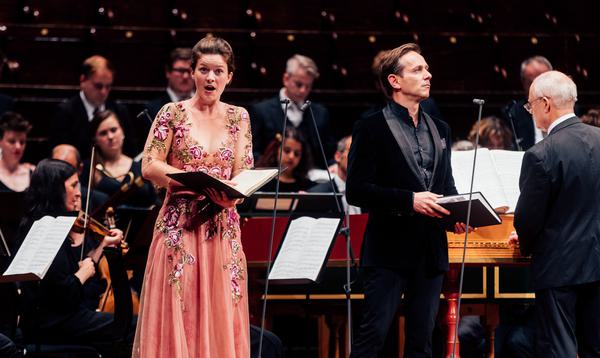
Liv Redpath and Iestyn Davies
© 2022 Credit : Ryan Buchanan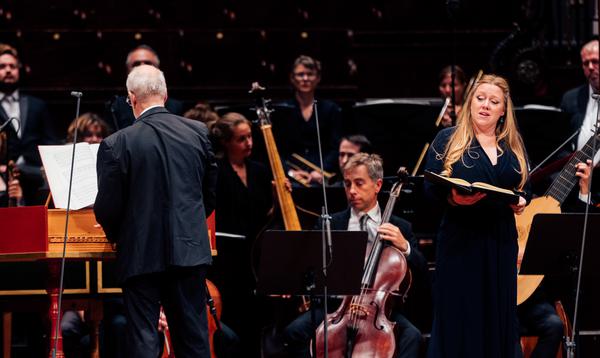
Sophie Bevan
© 2022 Credit : Ryan BuchananWho’s in the pit?
Handel experts The English Concert accompanied the soloists in this performance. The English Concert are known for their yearly international Handel Opera tour, so they’re intimately familiar with every detail of this work. That familiarity is evidenced in the intricacies of their memorable performance under the baton of conductor John Butt, described by one critic as ‘full of vigour and heart, sweetness and evil, sprightliness and elegance’.
How can I watch it?
You can watch the video below, or you can watch the concert alongside other digital performances via our YouTube channel. The recording is part of our 2022 At Home programme in partnership with abrdn.
This recording contains highlights from a performance at the Usher Hall as part of the 2022 Festival. The full concert recording to be released in spring 2023. These highlights are:
Act I, Scene 1:
- Allegro from Sinfonia
- Chorus: 'How excellent thy name, O Lord'
Act I, Scene 2:
- Recitative and Aria: 'He comes, he comes!... O godlike Youth' – Michal
Act I, Scene 5:
- Aria: 'O Lord, whose mercies numberless' – David
- Symphony – Harp solo
- Recitative: 'Tis all in vain' – Jonathan
- Aria: 'A serpent, in my bosom warm'd' – Saul
Act II, Scene 2:
- Recitative: 'Already see the daughters of the land' – Michal
Act II, Scene 3:
- Chorus: 'Welcome, welcome, mighty king!'
- Accompagnato: 'What do I hear? Am I then sunk so low' – Saul
- Chorus: 'David his ten thousands slew'
Get in on the act – become a Friend today
- Access to priority booking
- Exclusive members events
- Discounts and offers
- More benefits
Photo: Liv Redpath and Iestyn Davies in Saul
© 2022 Ryan Buchanan


